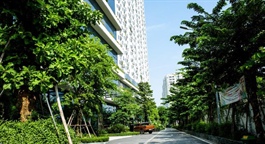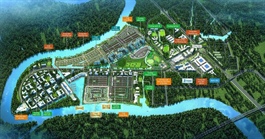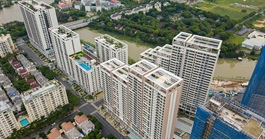High real estate tax not an effective solution: experts
High real estate tax not an effective solution: experts
While some experts suggest tax measures can help stabilise the property market in the short term, some say the current tax is not enough to prevent speculation and reduce real estate prices, but increasing supply will help.

After a series of land "fever" in many localities, the property tax story is again being discussed.
Under the direction of the Government, the Ministry of Finance is developing a report to review, evaluate and propose amendments to the property tax policy. The proposal was first made in 2018.
Tran Minh, a personal real estate investment consultant, said investment and speculation differed. Therefore, if taxed, the phenomenon of property flipping would be reduced, speculation reduced, and investors would be almost unaffected.
“If there is tax law, it will be difficult to reduce land prices. Only the phenomenon of property flipping can be reduced, speculation can be reduced, and for investors, often investing with a long-term vision, things are almost unaffected,” Minh said.
"Speculators and surfers often rely on insider information, so as long as information about planning and land prices is transparent, there will be no more speculation and property flipping.”
Nguyen Quoc Anh, deputy general director of batdongsan.com.vn, said: “Tax is only a measure to help stabilise the market in the short term. Taxing real estate and second homes does not mean stopping speculation and reducing the galloping momentum of real estate prices.”
Anh said the supply-demand relationship largely determined the price in the market.
“From a macro perspective, tax is a good solution, helping to increase revenue for the State budget and contribute to adjusting the market in the short term of 6-12 months or 1-2 years, but it cannot maintain impact in the long term,” he said.
Anh considered the tax tool would not be fully effective if the supply in the market continues to be scarce.
As 80 per cent of transactions occur in the capital and HCM City and the flow of people continues to these two cities, a long-term measure must be created to increase supply there, said Quoc Anh.
Nguyen Ngoc Hieu, head of the Market Research Department of batdongsan.com.vn, said that for investors, the increased tax would also increase the real estate cost.
If the profit from real estate investment is still at an attractive level, such costs will not reduce the enormous demand for real estate investment in Viet Nam.
On the other hand, the tax increase also increases real estate prices, making it difficult for many people to access housing, especially young people with low incomes.
Hieu also said that to cool down the property "fever" and reduce real estate prices, the key factor of the market is to increase supply.
“The abundant real estate supply will cause the market to self-regulate in terms of prices. The biggest contradiction in the real estate market now and in the coming years is the mismatch between supply and demand. The shortage of supply that has not been addressed will push real estate prices up, leading to speculation and property flipping.”
Le Xuan Mao, deputy general director of Corporate Tax Services at RSM Vietnam, takes a lot of time to study property tax policies.
For example, in 2011, China began to pilot the application of the tax on property holdings in Shanghai and Chongqing, said Mao, adding that after 10 years, the Chinese Government reconsidered widely implementing this tax.
Together with tax, credit tightening is considered to help land fever cool down.
The State Bank of Viet Nam (SBV) just sent an official letter requesting banks to strengthen control over credit growth in accordance with assigned targets; strictly control the growth rate of credit balance and credit quality for areas with potential risks or affected by the pandemic, notably, to strengthen control of credit grants to borrowers to participate in land auctions.
By the end of March and the beginning of April, Techcombank and Sacombank announced the suspension of disbursement of real estate loans.
In recent years, the SBV has granted credit growth limits to loans of different industries in which real estate was not a priority.
Therefore, credit growth in the real estate sector has also gradually decreased in recent years, from over 26 per cent in 2018 to 12 per cent in 2020, and been maintained at 12 per cent in 2021.



















